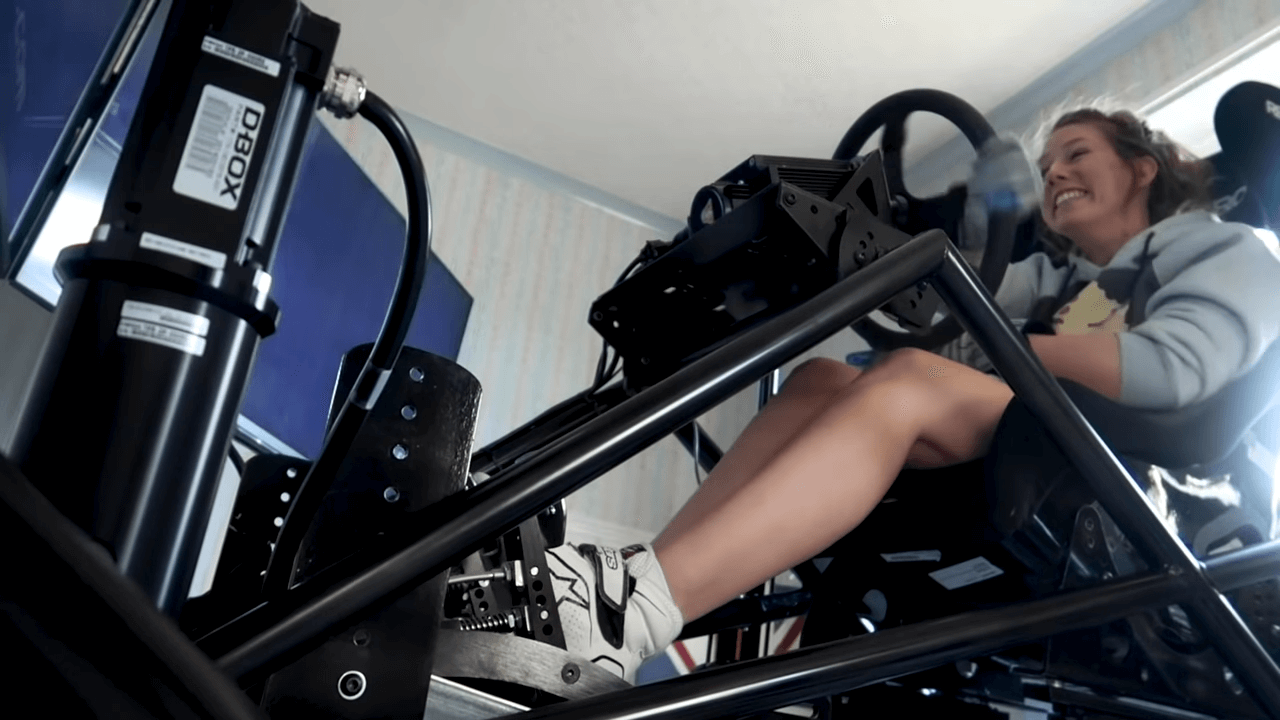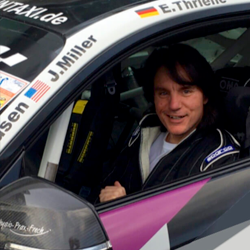Louise Cook and the thrill of the rally
Louise Cook is a WRC driver and two-time women’s British Rally champion who is breaking barriers in motorsport for women everywhere. In 2012, she won the WRC championship in the 2WD production vehicle class, making her the first woman to accomplish the feat!
At home, she’s equipped with a D-BOX haptic system comprised of 4, 6-inch actuators that perfectly replicates all the intense sensations that come from being in a rally vehicle.
“Being a rally driver, I tend to use rally games that have a lot of 3D stages, a lot of jumps and bumps, so I really put the actuators through their paces and they’ve been holding up really well,” she said. “I know that they’re really strong—super strong—and I’ll be using them for a long, long time.”
Since many rally stages and tracks in motorsport have been laser scanned for realism in their respective games, Louise’s haptic system allows her to attempt different techniques and strategies on different stages without having to put her car through the rough terrains that make up a rally stage. Thanks to haptic feedback, she’s able to truly get a feel for how her car will respond to different maneuvers that might be too dangerous to attempt in the real world and is able to train without incurring the incredibly high price tag that comes with a demanding discipline such as rally.

Professional sim racing with Mark Puc
Having been a sim racer since 1997—way before sim racing was mainstream—Mark Puc has been able to work his way up the ranks and today finds himself in the top few hundred sim racers in the world. He’s even been so successful at the sport that he has his own sim racing series!
His decades of involvement in the field of virtual racing have truly taught him the value of training with haptic feedback, which is why he’s equipped with 4, 1.5-inch D-BOX actuators on his rig at home.
“You can feel every little bump and niggle in the circuit surface, as well as what the car is doing itself,” he explained. “It feels extremely immersive. You can really feel the weight of the car with a D-BOX system!”
Racing with haptic feedback gives Mark an advantage over his opponents who are racing with a static haptic system because he quite literally feels every moment of the race. If there’s a part of the track that’s starting to crack from over-use, he’s going to be able to feel how his car responds to it and adapt appropriately, whereas those racing without haptic feedback will have to hope that they can visually see the cracks.

Moving up NASCAR classes with Anthony Alfredo
Anthony Alfredo is a current NASCAR XFINITY Series driver from the United States who made his entry into the NASCAR Cup series at only 21 years of age. A naturally gifted driver, he’s seen success in every series he’s participated in since he was only 6 years old!
Knowing the value of sim racing for real life drivers, Anthony has his own sim racing team and engages with his fans all around the world on platforms such as Twitch and YouTube to show them how he uses his D-BOX haptic system of 4 1.5-inch actuators to train off the track, and also sometimes just to mess around and have fun!
“D-BOX technology accurately represents the subtle cues you feel in a race car like the tires, suspension and chassis movement. That’s what makes this haptic system different from the other motion platforms that maybe just have varying speeds,” he said. “This is crucial for any user, especially a real-life driver like myself, using it as a training tool.
Being able to practice difficult manoeuvres without the risk of injury is invaluable to him, which is why he’s even created a series of educational videos on how to master the most crucial moves, such as how to apex a corner, how to bump and run and how to run the high line.
[With D-BOX], I get fully immersed in the sim […] and pretend I’m in a real race, only doing things I would actually do, and treat it just like real life,” he said. “I think that helps you really make the most of what iRacing and simulations have to offer. Because it feels like real life, the more I can get out of it, the more I could work on honing my skills. D-BOX has really allowed me to do this.”
Nothing but realism for the world’s best professional drivers
The integration of D-BOX’s haptic system as a training tool for professional drivers such as Louise, Mark and Anthony has revolutionized the way racers prepare for the real-life challenges that may pop up on the track or stage.
By providing a truly immersive environment in which drivers can physically feel the intricate sensations and forces encountered during a real race, haptic feedback helps to bridge the gap between the virtual and real and provides drivers with the opportunity to fine-tune skills, refine strategies and adapt to various terrains.
If you would like to start using a haptic system to improve your racing performances, then look no further than to what the pros use!